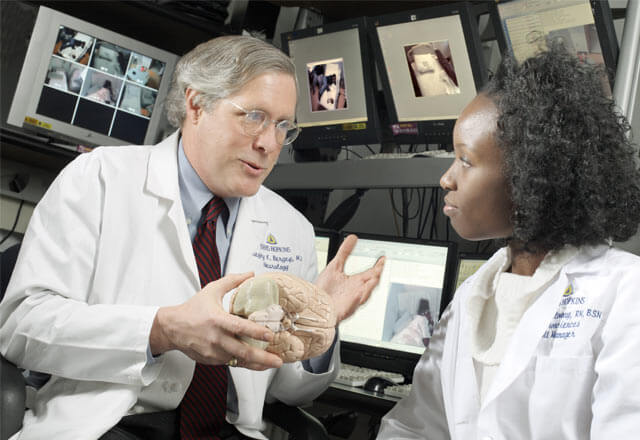Treatment for Epilepsy & Seizures
The Epilepsy Center at Johns Hopkins offers individually tailored treatment plans for all people with epilepsy, even those with the most challenging seizure disorders. Patients can benefit from treatments informed by recent research, including technologically advanced surgical options for seizures that do not respond to medication or diet.
Epilepsy Treatment: Why Choose Johns Hopkins

- The large number of patients we treat gives us unparalleled expertise in assessing and treating the full spectrum of epilepsy and seizure disorders.
- Johns Hopkins offers a First Seizure Clinic, Genetic Testing Clinic and a well-equipped Epilepsy Monitoring Unit to help diagnose seizures and epilepsy.
- Our team tailors each patient’s treatment plan with access to the most advanced medical, dietary and surgical therapies available.
- If you and your doctor decide that epilepsy surgery is right for you, we offer the most modern approaches, including laser interstitial thermal therapy (LiTT).
Epilepsy Assessment and Diagnosis
There are several different types of epilepsy, characterized by seizures, with symptoms causing changes in awareness, muscle tone, emotions, behavior and sensory experience. Proper treatment starts with a careful assessment of the person’s seizures, which may include:
- Medical and seizure history and neurological examination
- Neuroimaging: magnetic resonance imaging (MRI), magnetic resonance spectroscopy (MRS), positron emission tomography (PET), functional MRI (fMRI)
- Electroencephalogram (EEG), including outpatient video-EEG monitoring and long-term video-EEG monitoring
- Wada testing
- Neuropsychological, speech and hearing evaluations
- Physical and occupational therapy
- Counseling and support services for patients and caregivers
Epilepsy Treatment: What to Expect
There is more than one way to treat seizures or epilepsy. Based on your diagnosis, your doctor will discuss which therapies are likely to be most effective. These include:
Epilepsy Medication
Our doctors will work with you to find the most appropriate antiseizure medication for your symptoms, and calculate and adjust the dose to help bring your seizures under control.
The brain is a very complex organ and everyone responds to medications differently, so it may take several tries to determine the most appropriate medication and dosage.
Diet Therapy for Epilepsy, Including Ketogenic Diet
High fat, very low-carbohydrate diets, when calibrated and administered by a doctor and followed precisely, can help ease recurrent seizures in some cases. Johns Hopkins offers diet therapy for epilepsy for both pediatric and adult patients, using the ketogenic diet and the modified Atkins diet.
More about diet therapy for epilepsy
Epilepsy Surgery
Though some people may think of epilepsy surgery as a last resort, these procedures have advanced over the years to become alternatives to medications, especially when they fail to control the seizures or if the drugs’ side effects are too hard for the patient to tolerate.

